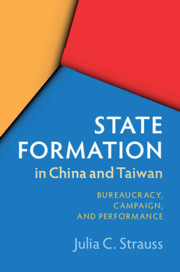Book contents
- State Formation in China and Taiwan
- State Formation in China and Taiwan
- Copyright page
- Dedication
- Contents
- Figures
- Acknowledgments
- Introduction
- 1 Virtue and Talent in Making Chinese States
- 2 Comparative Terror in Regime Consolidation
- 3 Performing Terror
- 4 Repertoires of Land Reform Campaigns in Sunan and Taiwan, 1950–1954
- 5 Theaters of Land Reform
- Conclusion
- Book part
- Documentary Collections, Reports, and Periodicals
- Bibliography
- Index
Conclusion
Published online by Cambridge University Press: 13 October 2019
- State Formation in China and Taiwan
- State Formation in China and Taiwan
- Copyright page
- Dedication
- Contents
- Figures
- Acknowledgments
- Introduction
- 1 Virtue and Talent in Making Chinese States
- 2 Comparative Terror in Regime Consolidation
- 3 Performing Terror
- 4 Repertoires of Land Reform Campaigns in Sunan and Taiwan, 1950–1954
- 5 Theaters of Land Reform
- Conclusion
- Book part
- Documentary Collections, Reports, and Periodicals
- Bibliography
- Index
Summary
In the introduction to this volume, I suggested that in the current literature on state building and state formation there is a gap between Weberian and Gramscian approaches that might be usefully bridged. Weberians assume that, with the right kinds of institutional design, good choices on the part of political leaders, and sufficient resources, effective state institutions with necessary state capacity will follow. Gramscians tend to sidestep questions of capacity to concentrate on the realm of ideas, cultural practices, and the ways in which individuals negotiate the “everyday state.” I posit that by linking “softer” concerns about culture and practices with “harder” questions of state formation, we might better understand the processes by which the state’s administrative institutions come to function under the challenging circumstances in which most states in the developing world find themselves.
- Type
- Chapter
- Information
- State Formation in China and TaiwanBureaucracy, Campaign, and Performance, pp. 243 - 258Publisher: Cambridge University PressPrint publication year: 2019



